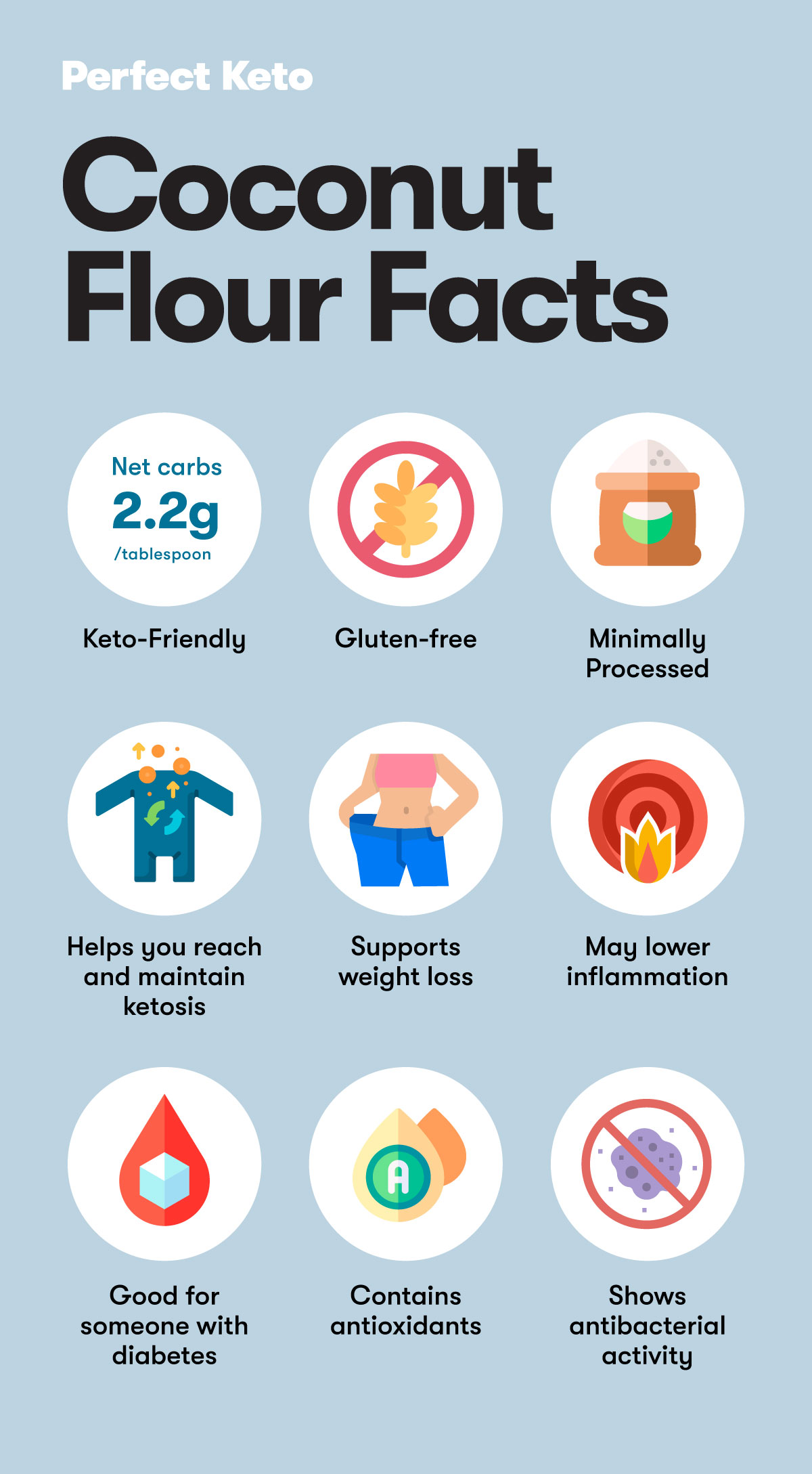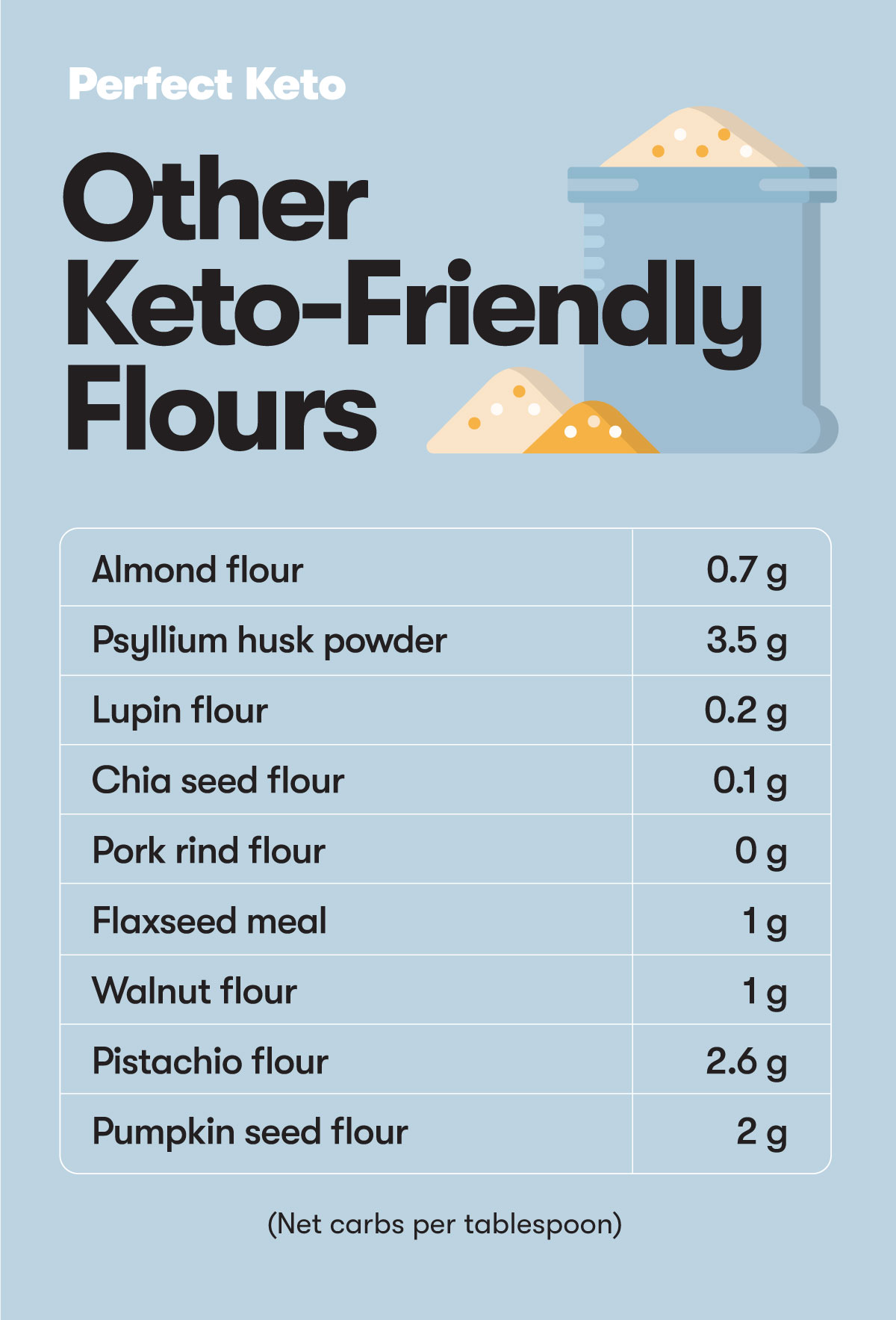Coconut flour is a popular ingredient in many health products, such as low-carb cookies, pancakes, and tortillas. As more people are adopting a healthier lifestyle, they turn to gluten-free and grain-free convenient snack foods made with this type of flour (*). But is coconut flour keto? How many carbs does it contain?
If you’re interested in learning more about coconut flour and whether it can fit into a very low-carb lifestyle, here’s what you need to know.
What is Coconut Flour?
Produced by grounding dried coconut pulp into a fine powder, coconut flour is a high-fiber, low-glycemic flour that’s used as an alternative to wheat flour. In fact, when you compare coconut flour with wheat flour, coconut flour has fewer carbohydrates per tablespoon — 2.2 grams of net carbs versus 5.8 grams of net carbs (*, *).
Coconut flour is versatile, meaning that you’ll be able to use it in a variety of recipes, such as baked goods, desserts, sauces, soups, and more. You will notice that it has a gritty texture and that it lends a faint aroma of coconut to your final product (which you’ll probably like).
Instead of using coconut flour as the main flour in recipes, many individuals use it as a “supporting flour” by mixing it with other low-carb flours — e.g. almond flour, lupin flour, and psyllium husk powder. This is to balance the flavor and texture of your baked goods.
Another thing to note is that coconut flour is highly absorbent. When using this low-carb flour for baking, avoid substituting it in a 1:1 ratio for white flour recipes. Instead, cut it down to about a fourth.
Is Coconut Flour Keto-Friendly?
The number of coconut flour carbs per tablespoon is 2.2 grams, making it a good flour option for someone on the keto diet. It’s not just keto-friendly, but it’s also gluten-free and minimally processed.
When it comes to health benefits, coconut flour has high levels of medium-chain triglycerides (or MCTs), which serve as an immediate source of energy. They get converted into ketones, helping you reach and maintain ketosis. Other benefits backed by research include weight loss, reduced abdominal obesity, and lowered inflammation (*).
Given that coconut flour has very few carbs, it has minimal impact on blood glucose, making it a healthy flour for people with diabetes. Moreover, research mentions that it contains antioxidants and demonstrates “antibacterial activity against some foodborne pathogenic bacteria.” (*)

Carbs in Coconut Flour
There are only 2.2 grams of net carbs in one tablespoon (or 9 grams) of coconut flour. The same serving provides less than 1 gram of fat and 1.3 grams of protein (*). Moreover, coconut flour is a good source of fiber, which does not trigger a spike in your blood sugar.
Here’s a tip: If you’re just learning how to count net carbs, subtract the grams of fiber from the total carbs.
Other Keto-Friendly Flours
Keto flour can be made from other food sources, such as almonds, nuts, seeds, and even pork rinds. We’ve put together a keto flour list below for whenever you need substitutes for coconut flour!
- Almond flour: Another preferred choice for keto dieters, almond flour is a source of many nutrients, including vitamin E and magnesium. It contains only 0.7 grams of net carbs per tablespoon (*)
- Psyllium husk powder: For fluffy and soft-textured baked foods, use psyllium husk. It has 3.5 grams of net carbs per tablespoon (*)
- Lupin flour: Here’s another gluten-free option that’s low on the glycemic index. Lupin flour contains only 0.2 grams of net carbs per tablespoon (*)
- Chia seed flour: Made from ground chia seeds, chia flour is rich in omega-3 fatty acids. It provides only 0.1 gram of net carbs per tablespoon (*)
- Pork rind flour: This animal-based flour is a perfect substitute for fried chicken breading. Made from ground pork rinds, it contains zero carbs per tablespoon (*)
- Flaxseed meal: High in fiber and quality protein, flaxseed meal improves the texture of your baked goods. It contains only 1 gram of net carbs per tablespoon (*)
- Walnut flour: This flour is loaded with magnesium and natural phytochemicals. Walnut flour provides only 1 gram of net carbs per tablespoon (*)
- Pistachio flour: Feel free to use pistachio flour as a base for your dips and sauces. It contains 2.6 grams of net carbs per tablespoon (*)
- Pumpkin seed flour: This flour comes from pumpkin seeds, a.k.a. “pepitas.” Pumpkin seed flour provides 2 grams of net carbs per tablespoon (*)

The Bottom Line
A healthy substitute for regular flour or wheat flour, coconut flour contains only 2.2 grams of net carbs in one tablespoon. Thanks to its low carbohydrate content — coconut flour is a good option for those on the keto diet! Recipes that call for this flour include sweet and savory baked goods, soups, and sauces. You definitely won’t run out of options with coconut flour in your pantry.
Read Next: The Ultimate Guide to Keto-Friendly Flours
